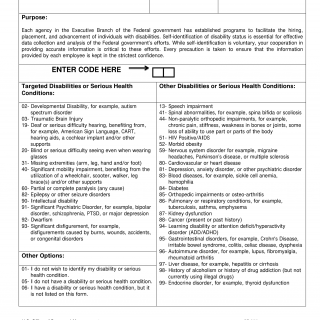SF 256. Self-Identification of Handicap
The SF 256 Self-Identification of Handicap form is used by federal agencies to collect information from applicants and employees regarding any disabilities they may have. The main purpose of this form is to promote equal employment opportunities for people with disabilities by providing federal agencies with information necessary to better understand and address the needs of disabled individuals.
The form consists of several parts, including basic identifying information, questions regarding the individual's disability, and certification of the accuracy of the information provided. The important fields to consider when compiling the form include the individual's name, contact information, and a detailed description of their disability.
The parties involved in this form are the applicant or employee completing the form and the federal agency collecting the information. It is important to consider that the information provided on this form is confidential and protected by the Privacy Act.
In order to complete the form, individuals will need to provide detailed information regarding their disability, including any documentation or medical records that may support their claim.
An example of an application for this form would be during the hiring process for a federal agency, or when an employee develops a disability during their employment and wishes to request accommodations.
The benefits of this form include promoting equal employment opportunities for individuals with disabilities and providing federal agencies with the information necessary to make necessary accommodations. However, there may be challenges and risks associated with disclosing sensitive medical information.
The information provided on this form can have a significant impact on the future of the applicant or employee, as it can affect their eligibility for certain benefits or accommodations.
The form is submitted directly to the federal agency collecting the information, and it is stored in accordance with the Privacy Act.

